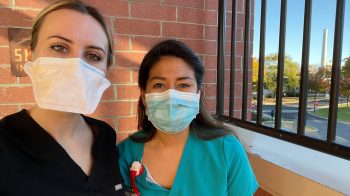Authentic Mexican food push: Delicioso!
TEXT OF STORY
Kai Ryssdal: You wouldn’t think Mexican food needs much help in this country. If you’ve got a hankering for it, there’s no shortage of restaurants out there. But the Mexican government doesn’t think a lot of what is served here is all that real. So it helped set up a new trade association to encourage the spread of more authentic cuisine. Sylvia Maria Gross from KCUR in Kansas City went to the first meeting of that trade association to get a taste.
SYLVIA MARIA GROSS: At this conference, one of the key sessions is lunch.
Chef Patricia Cabrera is feeding a choosy crowd: 150 restaurateurs. As she chops a pile of garlic, she tells me about the meal she’s preparing.
PATRICIA CABRERA: One avocado salad, and also I will have a callo de hacha cocktail. It’s a scallops cocktail. Want to try a bit of the tequila dressing?
GROSS: Sure.
When Cabrera opened her restaurant in Portland, Ore., six years ago, she didn’t want to make the standard Tex-Mex enchilada, smothered with cheese.
CABRERA: This Mexican food that I see in this country is not the Mexican food that I grew up. I tried to introduce the flavors that I grew up.
Mexican food is now the most popular ethnic food in the U.S., bigger than Italian or Chinese. The 90,000 or so Mexican restaurants include chains like Taco Bell and Chipotle, as well as mom-and-pop joints. And even at restaurants owned by Mexican immigrants, the food isn’t always “authentic.” But the Mexican government is trying to change that.
Jacob Prado is consul in Kansas City.
JACOB PRADO: Mexican food and Mexican gastronomy is part of our national identity. All the Mexican restaurants in this country are actually ambassadors of our culture.
The Mexican government helped found the Mexican Restaurant Association, or MERA. It now has more than 1000 members, ranging from hip San Francisco bistros to taquerias in Arkansas. Its members know there’s a growing demand for authenticity.
MERA convention organizer Angela Galvis says the association is trying to help them keep up.
ANGELA GALVIS: The super-chefs are coming here to actually tell a restaurateur: place a couple of tortilla chips and a little color and a tomato in a certain way, and you can charge a dollar more, because of the presentation.
In a kitchen upstairs, Mexico City chef Jorge Alvarez shows how he cuts banana leaves in circles, to line the plates for his cochinita pibil, a slow-roasted pork dish from the Yucatan peninsula.
Alvarez says U.S.-based chefs forget the flavors of their home country, and it’s hard to find key ingredients. MERA helps members locate and negotiate better prices for these products. It helps Mexican exports, too.
At his restaurant in Kansas City, Arturo Cabral serves up traditional seafood specialties, mole sauce and high-end tequilas. But he also has basic Tex-Mex on the menu.
ARTURO CABRAL: You have to give what’s in demand. So Kansas City loves that kind of food. I love that kind of food. So you have to have that.
Other countries have tried to raise the status of their cuisine abroad. A few years ago, the Italians tried to reclaim spaghetti and pizza from their cheesy American cousins. But whatever the cuisine, restaurant owners know they have to balance the ideal of culinary excellence, with the tastes of diners here in the U.S.
In Kansas City, I’m Sylvia Maria Gross for Marketplace.
There’s a lot happening in the world. Through it all, Marketplace is here for you.
You rely on Marketplace to break down the world’s events and tell you how it affects you in a fact-based, approachable way. We rely on your financial support to keep making that possible.
Your donation today powers the independent journalism that you rely on. For just $5/month, you can help sustain Marketplace so we can keep reporting on the things that matter to you.


















